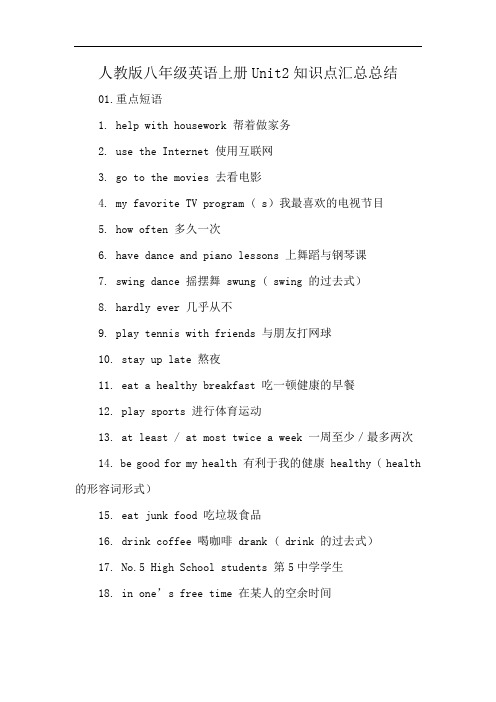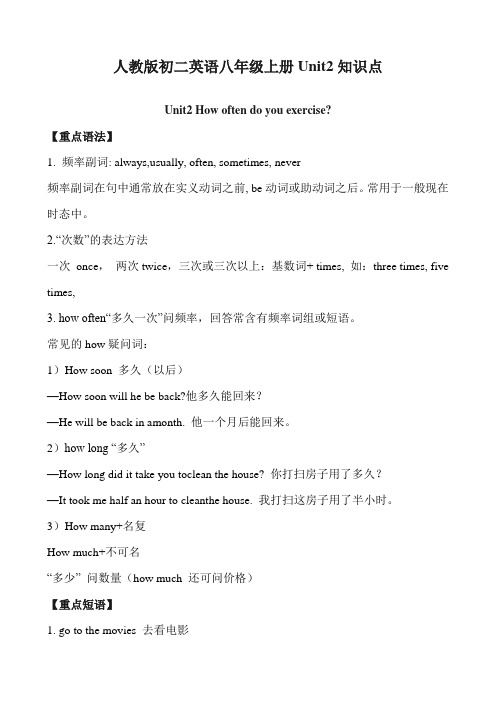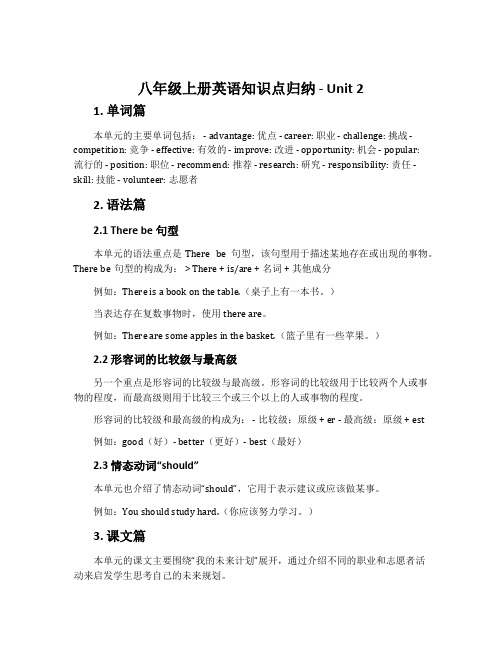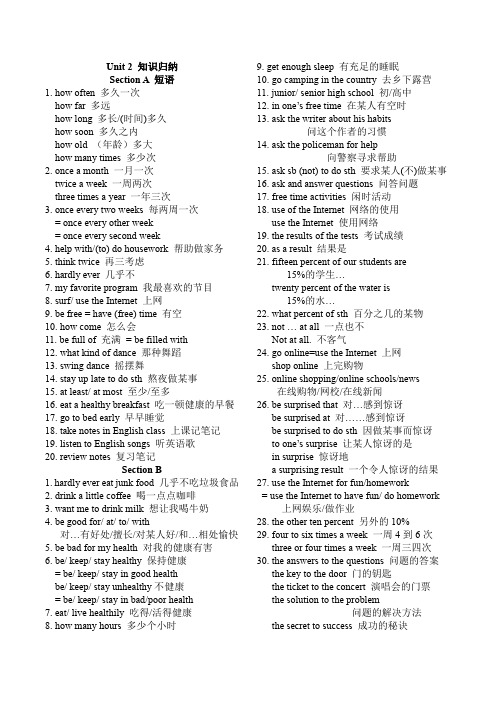八年级英语上册:Unit2知识点归纳
- 格式:pdf
- 大小:166.04 KB
- 文档页数:3

八年级英语上册Unit 2 How often do you exercie?必背知识点一、词汇短语1. help with housework:帮助做家务2. go shopping:购物3. on weekends/at weekends:在周末4. how often:多久一次5. hardly ever:几乎不6. once a week/month:每周/月一次7. twice a week/month:每周/月两次8. go to the movies:去看电影9. every day:每天10. use the internet:上网/用网11. be free:有空12. have dance and piano lessons:上舞蹈和钢琴课13. swing dance:摇摆舞14. play tennis:打网球15. stay up late:熬夜16. at least:至少17. go to bed early:早睡18. play sports:锻炼身体19. be good for:对……有好处20. go camping:去野营21. in one’s free time:在某人的空闲时间22. not…at all:根本不23. the most popular:最流行24. such as:例如25. go to the dentist:去看牙医26. old habits die hard:旧习惯难改27. less than:少于/不到二、语法结构1. 频率副词:always, usually, often, sometimes, never 等,用于描述动作发生的频率。
2. “次数”的表达方法:一次once,两次twice,三次或三次以上用基数词+times,如three times,five times。
3. how often 引导的特殊疑问句:用于询问动作发生的频率,回答常含有频率词组或短语。

英语八年级上册第二单元知识点* 短语:1. every day 每天2. how often 多久一次3. Animal World 动物世界4. use the Internet 上网5. be free=be not busy=have time 有空6. have dance and piano lessons上舞蹈和钢琴课7. swing dance 摇摆舞8. play tennis 打乒乓球9. stay up late 熬夜到很晚10. go to bed 去睡觉11. eat a healthy breakfast 吃一顿健康的早餐12. at least 至少,不少于,起码13. go to bed early 早睡觉14. go camping 去野营15. in one’s free time 在某人的业余时间里16. ask sb. about sth. 向某人询问某事* 应掌握的词组:how often do you exercise? 你多久锻炼一次?* 句子:1. Do you have enough time to practice the piano every day? 你每天有足够的时间练钢琴吗?2. How often do you watch Animal World? 你多久看一次《动物世界》?3. I usually use the Internet to search for information about science. 我通常上网搜索科学方面的信息。
4. I am always free on weekends. 我总是在周末有空。
5. My sister has dance and piano lessons every day. 我妹妹每天上舞蹈课和钢琴课。
6. Last weekend, we went to a swing dance club and had a great time. 上周末,我们去了一个摇摆舞俱乐部,玩得很开心。

八年级上册英语U2知识点梳理本文将为大家梳理八年级上册英语Unit 2的知识点。
此单元的主要内容为“My day”,包括描述日常生活的时间、日程、活动等。
以下是具体的知识点概括。
一、时间表达1. 表示时间的基本方法有两种:数字和表达式。
例如:7:30 → seven thirty;4:45 → quarter to five。
2. 表示时间的形式化方法有两种:AM和PM。
例如:9:00 AM → nine o’clock in the morning;7:00 PM → seven o’clock in the evening。
二、日程安排1. 表示日程安排的基本方法有两种:时间+活动,活动+时间。
例如:6:00 AM → get up;7:00 AM → have breakfast。
2. 表示日程安排的常见活动包括:get up、havebreakfast/lunch/dinner、go to school/bed、have classes、have a break、do homework、watch TV、play sports/games/music、go shopping、have a party。
三、常用语句1. 询问时间:What time is it? What’s the time? Do you have the time?2. 描述日程安排:What’s your plan for today/tomorrow? What do you usually do on weekends?3. 提供建议:You’d better go to bed early tonight. You should do more exercise.四、疑问句1. 一般疑问句:肯定回答用“Yes,主语+助动词”;否定回答用“No,主语+助动词+not”。
例如:Do you usually wake up at 6:30 AM? Yes,I do. / No,I don’t.2. 特殊疑问句:用来询问具体事实,通常以疑问词开头。

人教八年级英语上册第2单元知识点总结归纳Unit2 How often do you exercise?【重点语法】1.频率副词: always, usually, often, sometimes, never频率副词在句中通常放在实义动词之前, be动词或助动词之后。
常用于一般现在时态中。
2.“次数”的表达方法一次once,两次twice,三次或三次以上:基数词+ times,如:three times,five times,3. how often“多久一次”问频率,回答常含有频率词组或短语。
常见的how疑问词:1)How soon多久(以后)—How soon will he be back?他多久能回来?—He will be back in a month.他一个月后能回来。
2)how long“多久”—How long did it take you to clean the house?你打扫房子用了多久?—It took me half an hour to clean the house.我打扫这房子用了半小时。
3)How many+名复How much+不可名“多少”问数量(how much还可问价格)【重点短语】1. go to the XXX去看电影2. look after = take care of照顾3. surf the internet上网4. XXX健康的生活方式5. go XXX去划板6. keep XXX保持健康7. eating habits饮食气8. XXX exercise做更多的活动9. the same as与甚么不异10. be different from分歧11. once a month一月一次12. XXX一周两次14. most of the students=most students15. shop=go shopping=do some shopping购物18. come home from school放学回家19. of course = certainly = sure当然20. get good grades取得好成绩21. keep/be in good health坚持安康22. take a XXX去度假【词语辨析】1. maybe / may bemaybe是副词,意为“大约,大概,也许”,普通用于句首。

八年级英语上册Unit2知识点一、词汇与短语【重点单词】[A部分]1.housework n.家务劳动;家务事2.hardly adv.几乎不;几乎没有3.ever adv.在任何时候;从来;曾4.once adv. 一次;曾经5.twice adv.两次;两倍6.Internet n.(国际)互联网;因特网7.program n.节目8.full adj.忙的;满的;充满9.swing n.摆动;秋千 V. (使)摆动;摇摆10.maybe adv.大概;或许;可能11.least adv.最小;最少 adj. & pron.最小的;最少的[B部分]1.junk n.无用的东西;无价值的东西2.health n.健康;人的身体(或精神)状态3.result n.结果;后果4.percent n.百分之…5.online adj. & adp.在线(的);联网(的)6.although conj.虽然;尽管;即使7.through prep.以;凭借;穿过8.such adj. &pron.这样的;那样的;类似的9.mind n.头脑;心智10.together adv.在一起;共同11.die v.消失;灭亡;死亡12.dentist n.牙科医生13.magazine n.杂志;期刊14.however adv.然而;不过15.almost adv.几乎;差不多16.none pron.没有一个;毫无17.point n.得分;点 v.指;指向【重点短语】[A部分]1.how often 多久一次2.help with housework 帮助做家务3.hardly ever几乎从不4.on weekends 在周末5.once a week 每周一次6.twice a month 每月两次7.be free 有空8.go to the movies 去看电影e the Internet 用互联网10.have dance and piano lessons上舞蹈课和钢琴课11.swing dance 摇摆舞12.play tennis 打网球13.stay up late 熬夜;睡得很晚14.at least 至少;不少于;起码15.play sports 进行体育活动[B部分]1.junk food垃圾食品2.be good for 对…有好处3.go camping 去野营4.not … at all 一点儿也不5.go online 上网6.in one's free time 在某人的业余时间7.the best way to do sth. 做某事的最好方式8.such as例如;像这样9.more than 多于10.less than 少于【重点句子】[A部分]1.--What do you usually do on weekends?--I often go to the movies."在周末你通常做什么?”“我经常去看电影。

人教版八年级英语上册Unit2知识点汇总总结01.重点短语1. help with housework 帮着做家务2. use the Internet 使用互联网3. go to the movies 去看电影4. my favorite TV program ( s)我最喜欢的电视节目5. how often 多久一次6. have dance and piano lessons 上舞蹈与钢琴课7. swing dance 摇摆舞 swung ( swing 的过去式)8. hardly ever 几乎从不9. play tennis with friends 与朋友打网球10. stay up late 熬夜11. eat a healthy breakfast 吃一顿健康的早餐12. play sports 进行体育运动13. at least / at most twice a week 一周至少/最多两次14. be good for my health 有利于我的健康 healthy ( health 的形容词形式)15. eat junk food 吃垃圾食品16. drink coffee 喝咖啡 drank ( drink 的过去式)17. No.5 High School students 第5中学学生18. in one’s free time 在某人的空余时间19. ask them about their free time activities 询问他们关于他们的业余活动20. not … at all 根本不…21. go online 上网22. be surprised that ..感到惊讶23. use it for fun 为了取乐而使用它24. the answers to the questions 这些问题的答案25. one to three times a week 一周一到三次26. two percent of the students 2%的学生27. the best way to do sth.做某事的最好方式28. such as 例如29. spend time with your friends 与你的朋友共度时光spent ( spend 的过去式)30. spend time on sth./ in doing sth.花时间在某事上/做某事31. play together 一起玩32. watch TV for over 2 hours 看两个多小时电视33. go to the dentist 去看牙医34. a 16-year-old high school student 一名16岁的中学生35. have a lot of good habits 有许多好习惯36. more / less than two hours 多/少于两小时37. go to the dentist for teeth cleaning 去牙医处清洁牙齿38. go to the shopping center 去购物中心02.重点句子语法聚焦1. --What do you usually do on weekends?你在周末通常做什么?--I always exercise.我总是锻炼。

八年级英语上册Unit 2 How often do you exercise知识点归纳八年级英语上册Unit 2 How often do you exercise知识点归纳一、词组、短语:1、help with housework 帮助做家务活,2、go shopping 购物,3、on weekends 在周末,4、how often 多久一次,5、hardly ever几乎不,6、once a week 每周一次,7、twice a month每月二次,8、go to the movies去看电影,9、every day 每天,10、use the Internet上网/用网,11、be free有空,12、have dance and piano lessons 上舞蹈钢琴课,13、swing dance摇摆舞14、play tennis 打网球,15、stay up late熬夜,16、at least至少,17、go to bed early 早睡,18、 play sports 锻炼身体,19、be good for 对…有好处,20、go camping去野营,21、in one’s free time 在某人的空闲时间,22、not….at all 根本不,23、the most popular 最流行,24、such as例如,25、go to the dentist去看牙医,26、more than 超过/多于,27、Old habits die hard.旧习惯难改。
28、 hard=difficult 困难的,29、less than 少于/不到二、重要句子(语法):What do you usually do on weekends你周末通常做什么 I always exercise.总是锻炼身体。
What do they do on weekends他们周末干什么 They often help with housework.他们经常帮助干家务活。

八年级上册英语u2知识点总结Unit 2主要介绍了一些形容词和副词的用法,以及一些语法知识。
下面是本单元的知识点总结:一、形容词和副词的用法1.形容词形容词用于描述名词或代词的属性。
一般放在名词前面,例如:a tall boy(一个高个子男孩)。
2.副词副词用于描述动词、形容词、副词的程度或方式。
一般放在动词后面,例如:He walks slowly.(他走得慢慢的。
)二、比较级和最高级1.比较级比较级用于描述两个事物之间的比较,形容词和副词的比较级通常在单词末尾加“-er”,例如:taller(更高的),more carefully (更小心地)。
2.最高级最高级通常用于描述三个或三个以上的事物之间的比较,形容词和副词的最高级通常在单词末尾加“-est”,例如:tallest(最高的),most carefully(最小心地)。
三、祈使句祈使句表示请求、命令、建议、劝告等含义。
祈使句一般省略主语,动词用原形。
例如:Open the door.(开门。
)四、情态动词情态动词用于表示说话人的态度、愿望、建议、可能性等,常见的情态动词有:can、could、may、might、must、should、would 等。
例如:I should study harder.(我应该更努力学习。
)五、被动语态被动语态用于表示动作的承受者或者是动作的发生者不明确。
被动语态由助动词be+动词的过去分词构成,例如:The window was broken by the wind.(窗户被风摔碎了。
)六、虚拟语气虚拟语气用于表示非真实的情况,常见的虚拟语气有:与现在事实相反的虚拟语气、与过去事实相反的虚拟语气、与将来事实相反的虚拟语气等。
例如:If I were you, I would go to bed early.(如果我是你,我会早点睡觉。
)七、定语从句定语从句用于对一个名词或代词进行修饰。
定语从句通常由关系代词who、whom、whose、which、that引导。

八年级上册英语unit2知识点归纳八年级上册英语Unit 2知识点归纳八年级上册英语的Unit 2是关于“School life”的话题,主要是介绍学校和学校生活的相关词汇和常用语。
本文将整理Unit 2中的主要知识点,以便于学生更好地掌握英语知识,提高英语水平。
一、学校地点(Location)1. Class/ Classroom: 教室2. Library: 图书馆3. Computer room: 计算机房4. Science lab: 科学实验室5. Music room: 音乐室6. Office: 办公室7. Playground: 操场二、学校时间(Time)1. Class time: 上课时间2. Break time: 休息时间3. Lunch time: 午饭时间4. After-school program: 放学后活动三、学校相关人员(People)1. Teacher: 教师2. Student: 学生3. Principal: 校长4. Office staff: 办公人员5. Janitor: 门卫四、学校课程(Curriculum)1. Subject: 科目2. Math: 数学3. Science: 科学4. Social studies: 社会科学5. English: 英语6. Art: 艺术7. Music: 音乐8. PE(Physical education): 体育五、学校生活(School life)1. Attend school/ Go to school: 上学2. Take a bus/ Walk to school: 坐校车/ 步行3. Eat lunch/ Buy lunch: 吃午饭/ 买午饭4. Study for an exam: 为考试学习5. Join a club/ Sports team: 参加俱乐部/ 运动队6. Do homework/ Studying: 做作业/ 学习7. Use a computer: 使用电脑六、常用口语(Common expressions)1. What time is it? : 现在几点了?2. Good morning/ afternoon/ evening: 早上/ 下午/ 晚上好3. How are you? : 你好吗?4. What class do you have now? : 你现在有什么课?5. I’m sorry/ Excuse me: 对不起/ 打扰一下6. Can you help me please? : 你能帮我一下吗?7. Thank you: 谢谢8. Goodbye: 再见总结:本文所归纳的知识点为八年级上册英语Unit 2的内容,主要是围绕“School life”话题展开的。

Unit2 单元知识归纳总结【词汇归纳】housework n.家务劳动;家务事Internet n.(国际)互联网;因特网hardly adv.几乎不;几乎没有program n.( = programme)节目ever adv.在任何时候;从来full adj.忙的;满的;充满的maybe adv.大概;或许;可能once adv. 一次;曾经least adv.最小,最少;adj.& pron.最小的,最少的twice adv.两次;两倍junk n.无用的东西;无价值的东西coffee n.咖啡together adv.在一起;共同health n.健康;人的身体(或精神)状态die v.消失,灭亡,死亡writer n.作者;作家magazine n.杂志;期刊online adj.&adv.在线(的);联网(的)however adv.然而;不过than prep.&conj.(用以引出比较的第二部分)比television n.电视节目;电视机although conj.虽然;尽管;即使almost adv.几乎;差不多through prep.以;凭借;穿过less adv.较少,较小;adj.& pron.较少的,更少的mind n.头脑;心智such adj. & pron.这样的;那样的;类似的【短语归纳】how often 多久一次at least 至少;不少于;起码hardly ever 几乎不go to the movies 去看电影swing dance 摇摆舞every day 每天on weekends 在周末once a week —周一次go shopping 去购物twice a week —周两次three times a week 一周三次be full 忙的go to bed 去睡觉stay up 熬夜play sports 做运动junk food 垃圾食品not...at all 根本不play computer games 玩电脑游戏such as例如;像……这样be good for 对……有益a lot of 大量;许多go camping 去野营more than 多于…percent of ……百分之几的less than 少于【句子必背】1. —How often do you exercise?你多久做一次运动?一Every day.每天。

Unit 2 How often do you exercise?1.短语归纳2.典句必背3.用法集萃(1)How often do you watch TV? 你多久看一次❖how often意为“多长时间一次,每隔多久”,是对句中的often, usually,every day, sometimes, never, once a week等表示频率的词或短语提问,多用于一般现在时。
例:—How often do you go to see a film? 你多久看一次电影? —Once a week. 一周一次。
❖辨析:how often, how soon, how far与how long❖辨析sometimes, some times, sometime, some time(2)Oh, I have to play tennis with my friends. 哦,我必须和我的朋友们一起打网球。
❖have to意为“必须,不得不”,强调受客观条件的影响而“不得不去做某事”。
它有人称、数和时态的变化,在变为疑问句或否定句时要借助助动词do, does或did。
例:Does she have to go home now? 现在她必须回家吗?We had t walk to shoo yesterday. 昨天我们不得不步行去了学校。
(have to强调客观需要,must表示主观愿望和看法。
)(3)They often help with housework. 他们经常帮忙做家务。
❖help with意为“在某方面帮助”,是固定短语,也可写作help sb. with sth. 表示“在某方面帮助某人”❖拓展:help相关短语(4)But my mother wants me to drink it. 但是我妈妈想要我喝它(牛奶)。
❖want sb. to do sth. 属于“动词+宾语+宾补”的固定结构。

人教版初二英语八年级上册Unit2知识点Unit2 How often do you exercise?【重点语法】1. 频率副词: always,usually, often, sometimes, never频率副词在句中通常放在实义动词之前, be动词或助动词之后。
常用于一般现在时态中。
2.“次数”的表达方法一次once,两次twice,三次或三次以上:基数词+ times, 如:three times, five times,3. how often“多久一次”问频率,回答常含有频率词组或短语。
常见的how疑问词:1)How soon 多久(以后)—How soon will he be back?他多久能回来?—He will be back in amonth. 他一个月后能回来。
2)how long “多久”—How long did it take you toclean the house? 你打扫房子用了多久?—It took me half an hour to cleanthe house. 我打扫这房子用了半小时。
3)How many+名复How much+不可名“多少” 问数量(how much 还可问价格)【重点短语】1. go to the movies 去看电影2. look after = take care of 照顾3. surf the internet 上网4. healthy lifestyle 健康的生活方式5. go skate boarding 去划板6. keep healthy=stay healthy 保持健康7. eating habits 饮食习惯8. take more exercise 做更多的运动9. the same as 与什么相同10. be different from 不同11. once a month一月一次12. twice a week一周两次13. make a difference to 对......有影响/作用14. most of the students=moststudents15. shop=go shopping=do someshopping 购物16. be good for 对......有益17. be bad for 对......有害18. come home from school放学回家19. of course = certainly = sure 当然20. get good grades 取得好成绩21. keep/be in good health 保持健康22. take a vacation 去度假【词语辨析】1.maybe / may bemaybe 是副词,意为“大概,可能,或许”,一般用于句首。

八年级上册英语unit2知识点归纳人教版八年级上册英语Unit 2知识点归纳Unit 2的主要内容是关于家庭和朋友的,本文将对这个单元的知识点进行归纳总结。
一、家庭成员1.家人的称呼① father 父亲② mother 母亲③ parents 双亲(父母)④ grandfather 爷爷⑤ grandmother 奶奶⑥ grandparents 祖父母(外公外婆或者爷爷奶奶)⑦ son 儿子⑧ daughter 女儿⑨ children 孩子⑩ elder brother 哥哥⑪ younger brother 弟弟⑫ elder sister 姐姐⑬ younger sister 妹妹2.家庭成员的职业father:teacher, doctor, businessman, worker…mother:nurse, musician, artist, housewife…grandfather / grandmother:retired, farmer, scientist, writer…brother / sister:student, athlete, musician, artist, …二、家务1.厨房用具① microwave 微波炉② refrigerator 冰箱③ stove 火炉④ oven 烤箱⑤ blender 搅拌器⑥ toaster 烤面包机⑦ kettle 水壶2.家务动词① cook 做饭② wash the dishes 洗碗③ sweep 扫地④ mop 拖地⑤ clean the bathroom 打扫浴室⑥ make the bed 整理床铺⑦ do the laundry 洗衣服三、朋友1.朋友类型① best friend 最好的朋友② close friend 亲密的朋友③ new friend 新朋友④ childhood friend 童年时的朋友⑤ schoolmate 同学2.谈论朋友的习惯和特点① He / She is always there for me. 他 / 她总是在我身边。

八年级上册英语u2t2知识点在八年级上学期的英语教学中,Unit 2 Topic 2是一个重要的知识点。
该部分主要讲述了英语中一些常见的语法和词汇,今天我们就来逐一了解一下。
一、重点词汇1. tidy意为“整洁的”,其形容词形式为tidy,动词形式为tidy up。
例如:Please tidy up your room before you leave. (请在离开前把你的房间整理干净。
)2. disturb意为“打扰”,常用于被动语态,即be disturbed。
例如:I was disturbed by the noise. (我被这噪音打扰了。
)3. bother意为“烦扰”,与disturb的意思类似,常用于主动语态。
例如:Don't bother me when I'm studying. (我学习时请不要烦我。
)4. organize意为“组织,整理”,其名词形式为organization。
例如:We need to organize a party for our class. (我们需要为我们的班级组织一次派对。
)5. laundry意为“洗衣房,洗好的衣服”,其动词形式为wash。
例如:Can you help me with the laundry? (你能帮我洗衣服吗?)二、重点语法1. there be句型该句型表示“某处有某物或某人”的意思。
例如:There is a cat on the table. (桌子上有一只猫。
) 在这个句型中,谓语动词be应与后面的名词或代词保持一致。
2. 疑问句的转换将陈述句转换成一般疑问句时,需要在句首加do或does (主语为第三人称单数),将句子结尾的句点改成问号。
例如:You have a book. (你有一本书。
) → Do you have a book? (你有书吗?)将陈述句转换成特殊疑问句时,需要把疑问词放在句首,其余部分的顺序不变。

八年级上册英语知识点归纳 - Unit 21. 单词篇本单元的主要单词包括: - advantage: 优点 - career: 职业 - challenge: 挑战 - competition: 竞争 - effective: 有效的 - improve: 改进 - opportunity: 机会 - popular:流行的 - position: 职位 - recommend: 推荐 - research: 研究 - responsibility: 责任 - skill: 技能 - volunteer: 志愿者2. 语法篇2.1 There be句型本单元的语法重点是There be句型,该句型用于描述某地存在或出现的事物。
There be句型的构成为: > There + is/are + 名词 + 其他成分例如:There is a book on the table.(桌子上有一本书。
)当表达存在复数事物时,使用there are。
例如:There are some apples in the basket.(篮子里有一些苹果。
)2.2 形容词的比较级与最高级另一个重点是形容词的比较级与最高级。
形容词的比较级用于比较两个人或事物的程度,而最高级则用于比较三个或三个以上的人或事物的程度。
形容词的比较级和最高级的构成为: - 比较级:原级 + er - 最高级:原级 + est例如:good(好)- better(更好)- best(最好)2.3 情态动词“should”本单元也介绍了情态动词“should”,它用于表示建议或应该做某事。
例如:You should study hard.(你应该努力学习。
)3. 课文篇本单元的课文主要围绕“我的未来计划”展开,通过介绍不同的职业和志愿者活动来启发学生思考自己的未来规划。
课文中出现了一些常用的句型和表达方式,例如: - What do you want to be when you grow up?(你长大后想做什么?) - I want to be a teacher / engineer / musician, etc.(我想成为一名老师/工程师/音乐家。

Unit 2 知识归纳Section A 短语1. how often 多久一次how far 多远how long 多长/(时间)多久how soon 多久之内how old (年龄)多大how many times 多少次2. once a month 一月一次twice a week 一周两次three times a year 一年三次3. once every two weeks 每两周一次= once every other week= once every second week4. help with/(to) do housework 帮助做家务5. think twice 再三考虑6. hardly ever 几乎不7. my favorite program 我最喜欢的节目8. surf/ use the Internet 上网9. be free = have (free) time 有空10. how come 怎么会11. be full of 充满= be filled with12. what kind of dance 那种舞蹈13. swing dance 摇摆舞14. stay up late to do sth 熬夜做某事15. at least/ at most 至少/至多16. eat a healthy breakfast 吃一顿健康的早餐17. go to bed early 早早睡觉18. take notes in English class 上课记笔记19. listen to English songs 听英语歌20. review notes 复习笔记Section B1. hardly ever eat junk food 几乎不吃垃圾食品2. drink a little coffee 喝一点点咖啡3. want me to drink milk 想让我喝牛奶4. be good for/ at/ to/ with对…有好处/擅长/对某人好/和…相处愉快5. be bad for my health 对我的健康有害6. be/ keep/ stay healthy 保持健康= be/ keep/ stay in good healthbe/ keep/ stay unhealthy不健康= be/ keep/ stay in bad/poor health7. eat/ live healthily 吃得/活得健康8. how many hours 多少个小时9. get enough sleep 有充足的睡眠10. go camping in the country 去乡下露营11. junior/ senior high school 初/高中12. in one’s free time 在某人有空时13. ask the writer about his habits问这个作者的习惯14. ask the policeman for help向警察寻求帮助15. ask sb (not) to do sth 要求某人(不)做某事16. ask and answer questions 问答问题17. free time activities 闲时活动18. use of the Internet 网络的使用use the Internet 使用网络19. the results of the tests 考试成绩20. as a result 结果是21. fifteen percent of our students are15%的学生…twenty percent of the water is15%的水…22. what percent of sth 百分之几的某物23. not … at all 一点也不Not at all. 不客气24. go online=use the Internet 上网shop online 上完购物25. online shopping/online schools/news在线购物/网校/在线新闻26. be surprised that 对…感到惊讶be surprised at 对……感到惊讶be surprised to do sth 因做某事而惊讶to one’s surprise 让某人惊讶的是in surprise 惊讶地a surprising result 一个令人惊讶的结果27. use the Internet for fun/homework= use the Internet to have fun/ do homework 上网娱乐/做作业28. the other ten percent 另外的10%29. four to six times a week 一周4到6次three or four times a week 一周三四次30. the answers to the questions 问题的答案the key to the door 门的钥匙the ticket to the concert 演唱会的门票the solution to the problem问题的解决方法the secret to success 成功的秘诀31. by watching game shows通过看竞赛类节目32. the most popular 最受欢迎的33. be popular with sb 受…的欢迎34. the best way to relax 放松的最佳方式= the best way of relaxinga good place to have fun 娱乐的好地方35. through exercise/ lots of practice/ hard work通过锻炼/很多练习/辛勤的劳动36. go through the park/door/window穿过公园/门/窗go across the road/ bridge/river过马路/桥/河37. be healthy for the mind and body对身心健康有好处38. change one’s mind 改变某人的想法39. keep … in mind 牢记于心40. make up one’s mind to do sth= decide to do sth 下定决心做某事= make a decision to do sth41. such as playing sports 比如做运动42. for example,+句子例如43. Sb spend T/M on sth/(in) doing sthIt takes sb T to do sthSth cost sb MSb pay (M) for sth44. as/when you play together在你们一起玩的时候45. forget/remember to do sth忘记/记得要做某事forget/ remember doing sth忘记/记得做过某事46. Old habits die hard. 旧习难改47. die-died-dying-dead-death 死48. die of/ from 死于49. go to the dentist= see the dentist 看牙医50. a 16-year-old high school student一位16岁大的中学生51. more than two hours = over two hours两个多小时52. all /none of us 我们所有人都/都不53. both/ neither of them 他们俩都/都不54. either of you 你们俩之一55. less than 10 points 不到10分56. point out 指出57. point to / at 指着58. be afraid of (doing) sth 害怕某物be afraid to do sth 因害怕而不敢做某事重点句型1. How often does she watch TV?(问频率)He hardly ever watches TV. 一般现在时2. How soon will he come back?(问in +时间段) He will come back in an hour. 一般将来时3. He goes to the dentist once a year.(提问) How many times does he go to the dentist every year?He goes to the dentist once a year.(提问) How often does he go to the dentist?4. He may be free next week.(同义句)Maybe he is free next week.5. I sleep eight hours every night.(提问)How many hours do you sleep every night?I sleep eight hours every night.(提问)How long do you sleep every night.6. Here be 倒装句Here is the pencil and some books.Here come s the bus.Here it is./Here they are.7. Although 与but 不能连用,但可换同义句Although he works hard, he doesn’t get good grades. 虽然他很努力,但成绩不好。

八年级上册英语第二单元知识点八年级上册英语第二单元知识点整理随着全球化的发展,英语已成为连接世界的桥梁,学好英语将有助于个人在职业、学术和文化等方面取得更多的机会和成功。
以下是我为大家带来的八年级上册英语第二单元知识点整理,欢迎参阅呀!八年级上册英语第二单元知识点整理一、词语:1.matter: [′mætə]1)名词n. ① 事情;问题;事件[C]It was a matter of life and death for them.这事对他们来说是生死攸关。
What is the matter with this car?这辆汽车出了什么毛病?2)不及物动词 vi.①(常用于否定句和疑问句)有关系,要紧。
②It does not matter(if…)(即使……也)不要紧例如:When talking about fighting battles, Comrade Liu Bocheng often quotes a Sichuan proverb It does not matter if it is a yellow cat or a black cat, as long as it catches mice.2.back: [bæk]1)名词n.① 背脊,背部[C](in and on 的用法)Someone patted me on the back. 有人在我背上轻轻地拍了一下。
②后部[the S][(+of)]Grandpa and grandma sat in the back of the car.2)副词 adv..在原处;回原处come back形容词 adj. [Z]后面的,后部的He sat in the back seat of the car. 他坐在车子后面的座位上。
3.Rest:[rest]1)不及物动词 vi. 休息;睡; rests with sb ,2) 及物动词 The doctor tried to rest his patients mind at ease.3) The rest of the eggs , have a rest4、5.so: [səu]1)副词 adv. 这么,那么;【口】多么,非常Im so pleased to see you. 看到你我真高兴。

八年级上册英语unit2知识点Unit 2 Knowledge Points in 8th Grade English英语作为全球最为通行的语言之一,也是每个学生都需要学习掌握的语言之一,八年级英语是学生英语学习过程中一个比较重要的阶段,本篇文章将对八年级上册英语unit2中的知识点进行详细分析和解读。
1.反意疑问句反意疑问句是英语中一个比较常见的句型,一般是在陈述句后面加上一个反问的句子,用来表示确认或者确认对方的回答是否正确。
常见的反义疑问词包括“isn’t it”,“aren’t you”,“don’t they”等等。
例如:- You like apple, don’t you?- He isn’t a teacher, is he?- You will come back tomorrow, won’t you?2.否定和肯定在英语语法中,否定和肯定是两个非常基本和重要的概念。
在句子中,否定表示否定某种情况或者状态,而肯定则表示认可某种情况或者状态。
- You should not smoke in public places.(否定)- She is a very good student.(肯定)另外,时间、地点和情态动词的肯定和否定也是非常常见的。
3.一般过去时一般过去时是英语语法中最为基础的时态之一,它表示过去的行为或者状态,在语法中表现为动词加上-d或者-ed后缀。
- They arrived yesterday.(昨天他们到达了。
)4.动词的时态时态的英语语法就像汉语语法中的时态一样,表示动作发生的时间,英语中主要有14个时态,包括现在时、过去时、将来时等等。
时态的使用在英语作文和阅读中尤其重要,正确的时态使用可以大大提高文章的表达力和准确度。
例如:- I have just finished my homework.(我刚刚做完了我的家庭作业。
)5.一般现在时一般现在时表示动作正在进行或者表示真实情况,一般用于表明客观真实的事实或描述日常生活中的习惯、习性等等。

八年级上册英语unit2重点知识点本单元重点围绕一些日常生活常用的词汇和句型展开,方便学生进行适当的练习。
以下是本单元的主要知识点:一. 常用疑问句1. What’s your name?(你叫什么名字?)2. How old are you?(你多大了?)3. Where do you live?(你住在哪里?)4. What’s your phone number?(你的电话号码是多少?)5. What’s your WeChat/WhatsApp account?(你的微信/ WhatsApp 账号是多少?)二. 表达时间和日常活动1. What time is it?(现在几点了?)2. I get up at six o’clock.(我六点起床。
)3. I have breakfast at seven o’clock.(我七点吃早餐。
)4. I go to school at eight o’clock.(我八点去上学。
)三. 常见动词1. to watch(看)2. to play(玩、打)3. to listen(听)4. to eat(吃)5. to drink(喝)四. 形容词和副词1. happy(快乐的)2. sad(悲伤的)3. excited(兴奋的)4. tired(疲倦的)5. often(经常地)6. rarely(很少)7. always(总是)8. never(从不)五. 动名词和动词不定式1. She enjoys singing.(她喜欢唱歌。
)2. I want to learn English.(我想学英语。
)3. I love watching movies.(我喜欢看电影。
)4. He decided to join the basketball team.(他决定加入篮球队。
)总之,本单元是一个学习英语基础知识的好时机。
只需要认真记忆和练习,相信大家都可以轻松掌握这些基本表达方式。
8上Unit2知识点归纳
一、短语
1.比人聪明cleverer than people
2.更少的广告fewer advertisements
3.学校什么样?What’s school like?
4.玩具卡车a toy lorry/truck
5.英式英语British English
6.美式英语American English
7.给我的表兄买个足球buy a football for my cousin=buy my cousin a football
8.一块橡皮an erasr/a rubber
9.练习踢足球practise playing fo otball
10.在八年级in Year8=in Grade8=in the8th grade
11.一所混合学校a mixed school
12.在我的所有学科中among all my subjects
13.读书周a Reading Weeking
14.在读书周期间during the Reading Weeking
15.读更多的书read more books
16.临近这周结束时near the end of the week
17.在这周结束的时候at the end of the week
18.与某人讨论某事discuss sth with sb
19.与我的同学讨论这些书discuss the books with my classmates
20.在课堂上in class
21.上课have lessons=have classes=have a lesson=have a class
22.学习外语learn foreign languages
23.似乎开心seem happy=seem to be happy
24.似乎要做某事seem to do sth
25.似乎走的更快seem to go faster
26.对学校更多的了解learn more about the school
27.帮助某人做某事help sb with/do sth
28.认真倾听我的难题listen carefully to my problems
29.主动给我帮助offer me help=offer help to me
30.在星期五下午on Friday afternoon
31.结束比往常早en d earlier than usual
32.一起做运动do sports together
33.每次every time
34.上个月last month
35.打棒球play baseball
36.在我们三个中among the three of us
37.其他任何一个学生any other student
38.我的其他任何一个同学any other of my classmates
39.我的所有其他同学all my other classmates
40.其他的学生the other students
41.学生的数量the number of students
42.穿校服wear uniforms
43.做早操do morning exercises
44.放八个星期假have8weeks off
45.花两个小时做家庭作业spend2hours on homework=spend2hours doing homework
46.英国学校的生活life in a British school
47.另外半个小时another half an hour
48.下象棋play chess
49.最多,至多at most
50.阅读do some reding
51.位于第一come first
52.进行英语测试have an English test
53.浏览问题look through the questions
54.读的非常慢read very slowly
55.首先,一开始at first
56.坚持做某事keep doing
57.坚持用英语写作keep writing in English
58.我的日常生活my daily life
59.学习使用英语learn to use English
60.通过这种方式(in)this way
61.在周at/on weekends=at/on the weekend
62.玩的开心have a lovely time
63.进行每个学科的月考have a monthly test on each subj ect
64.美术俱乐部Art Club
65.进行学校旅行go on a school trip
66.需要早起need to get up early
67.有一个小时的作业have an hour of homework
68.有许多时间做课外活动have lots of time for after-school activities
69.一个又大又干净的食堂a big clean dining hall.
70.听音乐listen to music
71.戴领带wear ties
72.在每个班in each class
73.选课学习choose subjects to study
74.上电脑课have computer lessons
75.足球场a football field
76.游泳池a swimming pool
77.玩的开心,过得愉快have fun
78.我的理想学校my ideal school
二、句型
1.We’re cleverer than people.
2.There are fewer advertisements.
3.They have to worker harder.
4.Boys and girls have lessons together.
5.Among all my subjects,I like French best.
6.Learning foreign languages is fun.
7.I often read more books than my classmates.
8.Time seems to go faster when we are reading interesting books.
9.On Friday afternoon,our school ends earlier than usual.
10.Our team won two games last month.
11.Kitty has the most eggs.
12.She ran faster than Millie.
13.Amy came first in the race.She ran the fastest.
14.Sunshine Middle School has the most teachers and students of the three.
15.Chinese students have more weeks off for the summer holiday than British students.
16.British students spend less time doing homework than Chinese students.
17.Among the three schools,American students spend the least time on homework.
18.They work the hardest.
19.I have only half an hour for my hobbies at most.
20.To me,learning foreign langages is really f un.
21.We have lots of time for after-school activities.
22.We only have an hour of homework every day.
三、语法
1.数量的比较
(1)more表示更多,即可指可数名词也可指不可数名词。
例:Millie has more tomatoes than Daniel.
(2)fewer表示更少,指可数名词(复数)
例:Millie has fewer bananas than Kitty.
(3)less表示更少,指不可数名词
例:Millie has less rice than Daniel.
(4)fewest表示最少,指可数名词(复数)
例:Daniel has the fewest tomatoes of the three.
(5)least表示最少,指不可数名词
例:Millie has the least juice among the students.
2.副词的比较,与上一单元的用法一致。
3.形容词与副词
(1)形容词修饰名词(指人或者物);副词修饰动词/形容词。
(2)形容词变为副词,一般只要在形容词后加上ly;以y结尾的,把y变成i再加ly.例:careful-carefully strong-strongly
quick=quickly heavy-heavily
slow-slowly happy-happily
usual-usually easy-easily。